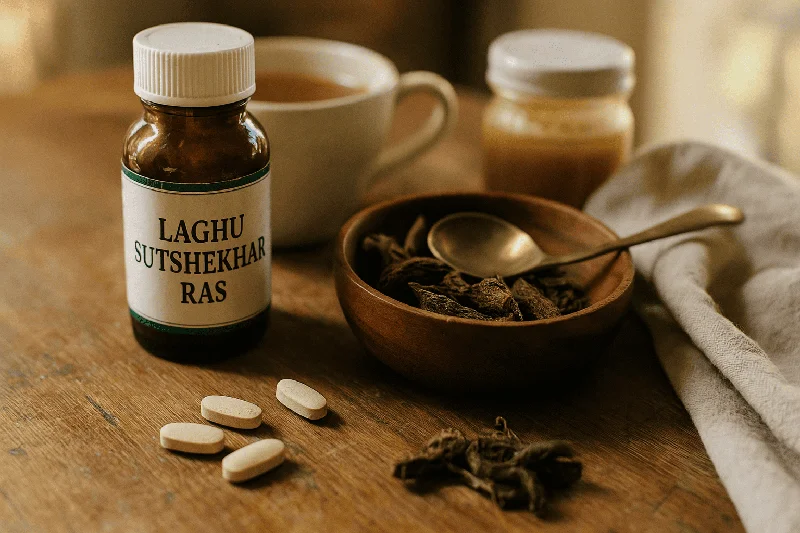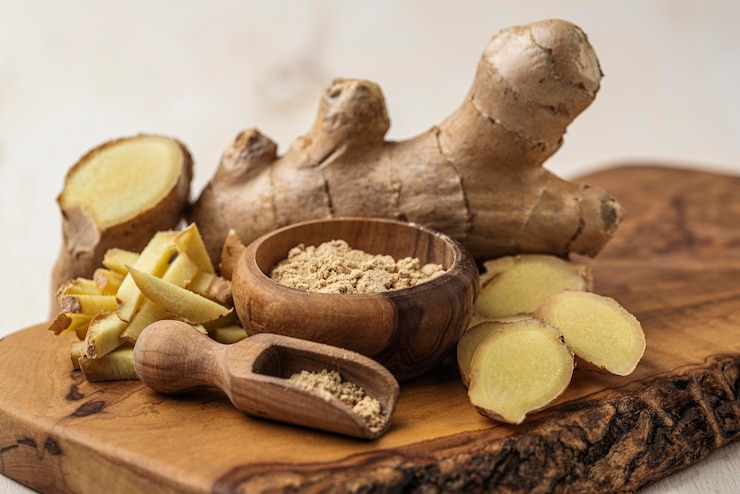Ask Ayurvedic doctor a question and get a consultation online on the problem of your concern in a free or paid mode. More than 2,000 experienced doctors work and wait for your questions on our site and help users to solve their health problems every day.
Laghu Sutshekhar Ras Uses: A Comprehensive Guide

Ayurvedic formulations have long held a place in integrative healthcare, especially for managing digestive concerns, alleviating hyperacidity, and supporting overall well-being. Among these preparations, Laghu Sutshekhar Ras has gained prominence for its potential to soothe gastrointestinal discomfort and optimize bodily functions. This article delves into the uses, benefits, and research associated with Laghu Sutshekhar Ras, offering both a traditional Ayurvedic perspective and insights drawn from modern scientific research. Read on to discover how this formulation works, its possible applications, dosage considerations, and more.
Introduction: A Time-Tested Formula With Modern Relevance
Picture an individual struggling with frequent episodes of acidity, heartburn, or indigestion. While conventional antacids might offer temporary relief, they may not always address the underlying imbalances comprehensively. This scenario underlines why integrative medicine often turns to formulations like Laghu Sutshekhar Ras. This time-tested Ayurvedic preparation is traditionally used for managing hyperacidity, balancing digestive fire (Agni), and supporting gastrointestinal health. According to the principles of Ayurveda, a balanced Agni is essential for overall vitality, immunity, and the proper digestion of nutrients. When the digestive fire becomes imbalanced, symptoms such as acid reflux, bloating, or excessive gas can emerge. Laghu Sutshekhar Ras, with its complex mixture of herbs and mineral components, aims to help maintain equilibrium within the digestive system. Modern scientific interest in Ayurvedic formulations has grown steadily in recent decades. Researchers have begun to study these remedies for their potential efficacy and mechanisms of action, offering a scientific lens to understand how they might work in conjunction with or even complement standard medical treatments.
Don't wait or self medicate. Start chat with Doctor NOW
What is Laghu Sutshekhar Ras?
Composition and Key Ingredients
Laghu Sutshekhar Ras is a classical Ayurvedic medicine that often contains a blend of:
-
Shankha Bhasma (Conch shell calx): Traditionally used in Ayurvedic formulas for acidity and digestive discomfort. According to certain Ayurvedic texts, it helps in balancing Pitta dosha, which governs metabolism and digestion.
-
Sunti (Zingiber officinale) or dried ginger powder: Renowned for its anti-inflammatory properties and beneficial effects on digestion.
-
Pippali (Piper longum): Often included to support digestive strength and nutrient absorption.
-
Black Pepper (Piper nigrum): Known for enhancing bioavailability and promoting healthy metabolism.
-
Processed in media like Lemon Juice or Aloe Vera Juice: This helps in potentiating the effects of the herbs and improving absorption.
Formulations can vary depending on the manufacturer, but the overarching goal is the same: to relieve acidity, enhance digestion, and maintain a healthy digestive tract.
Traditional Ayurvedic Rationale
In Ayurveda, Laghu Sutshekhar Ras is categorized under Rasashastra (the branch that deals with minerals and metals). Rasashastra preparations undergo rigorous purification processes, intended to ensure safety and maximize therapeutic benefits. The synergy of herbs and mineral components in Laghu Sutshekhar Ras is believed to balance Pitta dosha, thus preventing excessive acid production.
Evidence-Based Insights: Modern Research on Laghu Sutshekhar Ras Uses
While rigorous, large-scale clinical trials specifically on Laghu Sutshekhar Ras are still developing, several peer-reviewed studies and emerging research point toward its potential benefits:
-
Digestive Support: A study published in the Journal of Ayurveda and Integrative Medicine suggested that certain ingredients commonly found in Laghu Sutshekhar Ras (like ginger and pippali) may support gastric motility and reduce acid reflux by modulating digestive secretions and gut motility.
-
Anti-inflammatory Effects: Phytotherapy Research has highlighted the anti-inflammatory properties of ginger (Sunti) and black pepper (Piper nigrum). These can help alleviate gastrointestinal inflammation, which is often linked to chronic acidity.
-
Enhanced Bioavailability: Pippali and black pepper contain piperine, a compound that can increase the bioavailability of various nutrients and medicinal compounds, as reported in studies available on PubMed.
-
Possible Synergistic Action: Ayurvedic formulations often rely on synergy—where multiple ingredients produce an effect greater than the sum of their individual actions. Although more robust clinical trials are needed, preliminary findings indicate that such synergy could lead to quicker and more sustained relief of digestive discomfort.
How Laghu Sutshekhar Ras Works: Mechanisms and Theoretical Applications
-
Balancing Acidity (Pitta Shamana): The primary rationale for using Laghu Sutshekhar Ras is to manage hyperacidity. Ayurvedic texts attribute this effect to its ingredients that possess cooling and buffering qualities, helping neutralize excess acid in the gastrointestinal tract.
-
Supporting Gut Lining: Chronic acidity can irritate the mucosal lining of the stomach, potentially leading to ulcers over time. Some practitioners suggest that ingredients in Laghu Sutshekhar Ras may provide a protective layer to the stomach lining.
-
Regulating Digestive Fire: Ayurveda emphasizes that balanced digestion relies on an even, healthy digestive fire (Agni). By supporting Agni, Laghu Sutshekhar Ras may help in more efficient breakdown and assimilation of nutrients, reducing the likelihood of digestive stagnation.
-
Holistic Impact on Dosha Balance: Beyond digestion, the formula aims to maintain a balanced state of Vata, Pitta, and Kapha. Proper dosha equilibrium is linked to overall wellness, including mental clarity, stamina, and immunity.
Potential Uses and Benefits in Healthcare
-
Hyperacidity and Acid Reflux Management: People struggling with frequent heartburn, acid reflux, or gastritis may benefit from Laghu Sutshekhar Ras under professional supervision.
-
Support in Dyspepsia and Indigestion: Traditional usage suggests it can ease symptoms like bloating, flatulence, and discomfort after meals.
-
Holistic Digestive Tonic: Beyond acute issues, this formulation might serve as a supplementary approach for maintaining overall digestive wellness, especially when combined with dietary modifications and stress management.
-
Adjunct to Modern Treatments: In some integrative medicine settings, Laghu Sutshekhar Ras can be used alongside conventional treatments for acid reflux or peptic ulcer disease. However, research on combination therapy is still evolving, and medical supervision is essential.
Dosage and Administration Guidelines
Disclaimer: Always consult a qualified Ayurveda practitioner or healthcare professional before starting any new supplement or herbal preparation, including Laghu Sutshekhar Ras. Individual needs can vary based on age, health status, and co-existing medical conditions.
-
Common Dosage Range: Traditional texts often recommend 125 mg to 250 mg, taken once or twice daily with suitable adjuvants like honey or warm water.
-
Timing: Some practitioners suggest taking it before meals to help regulate acid secretion. However, dosage timing can differ, so personalized advice is crucial.
-
Adjuvants: Honey, warm water, or ghee are typically recommended carriers, as they can enhance both the taste and therapeutic efficacy.
-
Duration of Use: Short-term administration (a few weeks) may suffice for acute issues like hyperacidity. Longer durations may be advised for chronic conditions but should be closely monitored.
Safety, Side Effects, and Precautions
-
Potential Metallic Content: Because Laghu Sutshekhar Ras may involve metallic or mineral components (like Shankha Bhasma), ensuring the product is manufactured by a reputable company following Good Manufacturing Practices (GMP) is critical for safety.
-
Allergic Reactions: While rare, individuals allergic to specific components (e.g., ginger, black pepper) might experience mild discomfort or allergic reactions.
-
Pregnancy and Lactation: Due to limited clinical data, pregnant and lactating individuals should exercise caution and consult a healthcare professional.
-
Drug Interactions: It’s vital to inform your doctor about all medications and supplements you are taking. Some of the herbal components in Laghu Sutshekhar Ras could interact with prescription drugs, especially those affecting the digestive or cardiovascular systems.
-
Monitoring: If used long-term, periodic check-ups and lab tests might be advisable. Experts may look at liver function, kidney function, or other parameters to ensure the body is handling the herbal-mineral formulation safely.
Clinical Guidelines and Expert Opinions
-
Clinical Protocols: While no universal protocol exists for incorporating Laghu Sutshekhar Ras into modern clinical practice, some integrative medicine clinics use it based on guidelines laid out by the Central Council for Research in Ayurvedic Sciences (CCRAS) in India.
-
Expert Consensus: Ayurvedic practitioners frequently cite centuries of anecdotal evidence, but experts agree that more large-scale, randomized, double-blind clinical trials are needed to establish standardized dosage and validate efficacy claims.
-
Authoritative Perspectives: Organizations like the World Health Organization (WHO) and National Institutes of Health (NIH) encourage research and documentation of traditional practices. Although these agencies have not issued specific statements on Laghu Sutshekhar Ras, their stance on complementary medicine is generally supportive of evidence-based integration.
Practical Tips for Everyday Use
-
Dietary Adjustments: Enhance the benefits of Laghu Sutshekhar Ras by reducing spicy, oily, or excessively acidic foods in your diet.
-
Lifestyle Balance: Regular exercise, adequate hydration, and stress management (through yoga or meditation) can significantly improve digestive health.
-
Regular Monitoring: Keep a symptom diary if you’re using Laghu Sutshekhar Ras to track improvements, note any side effects, and discuss them with your healthcare provider.
-
Holistic Approach: Combine your regimen with other Ayurvedic practices, such as Triphala for colon health or Ashwagandha for stress management, under professional guidance.
Frequently Asked Questions (FAQ)
Q1: Can Laghu Sutshekhar Ras be taken daily for long-term maintenance?
A: While many people use it for extended periods under Ayurvedic guidance, it’s crucial to consult a healthcare professional for personalized advice. Dosage and duration depend on your specific health condition and constitution.
Q2: Is it safe for children?
A: Administration to children should be under the direct supervision of a qualified pediatrician or Ayurvedic practitioner. Dosages are typically lower, and potential interactions or contraindications must be considered carefully.
Q3: Are there any known interactions with over-the-counter antacids?
A: Some herbal components in Laghu Sutshekhar Ras could amplify or alter the effects of antacids. Consult a medical expert before combining therapies.
Q4: What if I experience worsening symptoms or unusual side effects?
A: Discontinue use and seek immediate medical advice. Although adverse reactions are rare, it’s best to rule out any underlying complications.
Q5: Is there scientific evidence supporting its efficacy?
A: Research on individual ingredients like ginger, pippali, and black pepper is robust, showing anti-inflammatory and digestive benefits. More controlled human studies on the specific formulation are needed, but preliminary findings are promising.
Conclusion: The Future of Laghu Sutshekhar Ras in Modern Health
From managing hyperacidity to supporting a balanced digestive system, Laghu Sutshekhar Ras embodies the holistic essence of Ayurveda. Its unique blend of herbs and minerals aligns with the body’s natural rhythms, aiming to restore balance and promote wellness. Emerging scientific insights suggest that the synergistic action of its ingredients may hold significant potential in integrative healthcare, though more comprehensive clinical trials are needed to further validate these claims. If you’re curious about exploring Laghu Sutshekhar Ras for your healthcare routine, discuss the possibility with a qualified professional to tailor a safe and effective plan.
Disclaimer: This article is intended for informational purposes only and does not substitute professional medical advice. Always consult a licensed healthcare practitioner for personalized guidance, diagnoses, or treatment plans.
Call to Action:
If you found this guide on Laghu Sutshekhar Ras uses insightful, consider sharing it with friends or colleagues who might benefit from learning about integrative health options. Feel free to leave a comment or subscribe to our newsletter for more evidence-based articles on Ayurveda and modern medical research. Your feedback helps us bring you the most trusted and up-to-date information possible. Stay informed, stay healthy!



